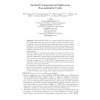Free Online Productivity Tools
i2Speak
i2Symbol
i2OCR
iTex2Img
iWeb2Print
iWeb2Shot
i2Type
iPdf2Split
iPdf2Merge
i2Bopomofo
i2Arabic
i2Style
i2Image
i2PDF
iLatex2Rtf
Sci2ools
118
click to vote
TCC
2016
Springer
2016
Springer
Optimal Computational Split-state Non-malleable Codes
Abstract. Non-malleable codes are a generalization of classical errorcorrecting codes where the act of “corrupting” a codeword is replaced by a “tampering” adversary. Non-malleable codes guarantee that the message contained in the tampered codeword is either the original message m, or a completely unrelated one. In the common split-state model, the codeword consists of multiple blocks (or states) and each block is tampered with independently. The central goal in the split-state model is to construct high rate nonmalleable codes against all functions with only two states (which are necessary). Following a series of long and impressive line of work, constant rate, two-state, non-malleable codes against all functions were recently achieved by Aggarwal et al. (STOC 2015). Though constant, the rate of all known constructions in the split state model is very far from optimal (even with more than two states). In this work, we consider the question of improving the rate of split-state ...
Cryptology | TCC 2016 |
| Added | 10 Apr 2016 |
| Updated | 10 Apr 2016 |
| Type | Journal |
| Year | 2016 |
| Where | TCC |
| Authors | Divesh Aggarwal, Shashank Agrawal, Divya Gupta 0001, Hemanta K. Maji, Omkant Pandey, Manoj Prabhakaran |
Comments (0)

